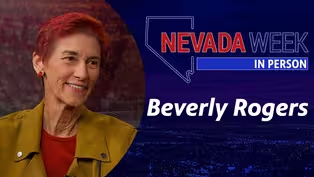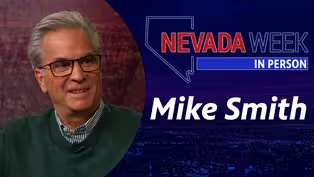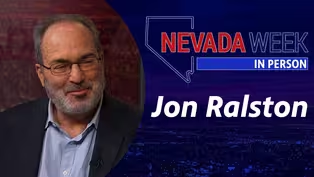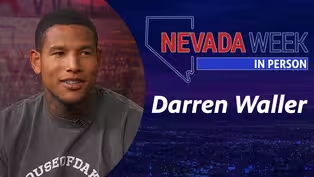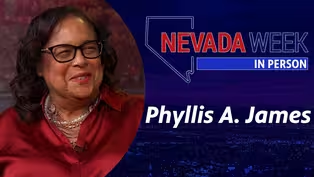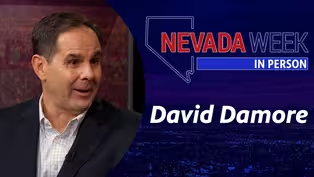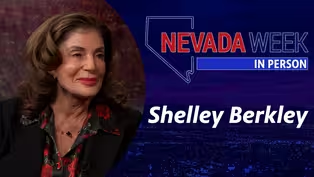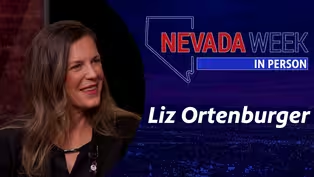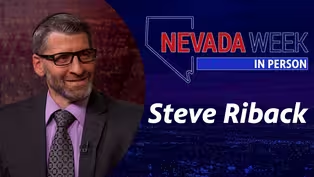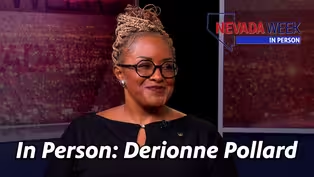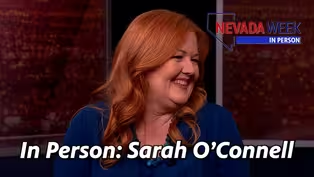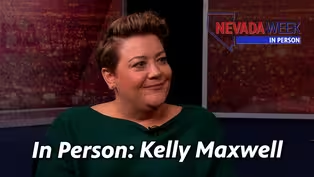
Nevada Week In Person | Angela Brommel
Season 1 Episode 39 | 14mVideo has Closed Captions
One-on-one interview with Clark County Poet Laureate Angela Brommel.
One-on-one interview with Clark County Poet Laureate Angela Brommel.
Problems playing video? | Closed Captioning Feedback
Problems playing video? | Closed Captioning Feedback
Nevada Week In Person is a local public television program presented by Vegas PBS

Nevada Week In Person | Angela Brommel
Season 1 Episode 39 | 14mVideo has Closed Captions
One-on-one interview with Clark County Poet Laureate Angela Brommel.
Problems playing video? | Closed Captioning Feedback
How to Watch Nevada Week In Person
Nevada Week In Person is available to stream on pbs.org and the free PBS App, available on iPhone, Apple TV, Android TV, Android smartphones, Amazon Fire TV, Amazon Fire Tablet, Roku, Samsung Smart TV, and Vizio.
Providing Support for PBS.org
Learn Moreabout PBS online sponsorshipMore from This Collection
Nevada Week In Person goes beyond the roundtable discussion of Nevada Week with guests for a more casual conversation about their personal passions, new projects and compelling stories that are overlooked in the flurry of the news cycle.
Nevada Week In Person | Beverly Rogers
Video has Closed Captions
One-on-one interview with Rogers Foundation chair Beverly Rogers. (14m)
Nevada Week In Person | Mike Smith
Video has Closed Captions
One-on-one interview with Las Vegas Sun political cartoonist Mike Smith. (14m)
Nevada Week In Person | Jon Ralston
Video has Closed Captions
One-on-one interview with The Nevada Independent CEO Jon Ralston. (14m)
Nevada Week In Person | Darren Waller
Video has Closed Captions
One-on-one interview with Las Vegas Raider tight end Darren Waller. (14m)
Nevada Week In Person | Phyllis A. James
Video has Closed Captions
One-on-one interview Phyllis A. James. (14m)
Nevada Week In Person | David Damore
Video has Closed Captions
One-on-one interview with Chair of the Department of Political Science at UNLV David Damor (14m)
Nevada Week In Person | Shelley Berkley
Video has Closed Captions
One-on-one interview Senior Vice President for Touro University Shelley Berkley. (14m)
Nevada Week In Person | Liz Ortenburger
Video has Closed Captions
One-on-one interview with SafeNest CEO Liz Ortenburger. (14m)
Nevada Week In Person | Steve Riback
Video has Closed Captions
One-on-one interview with Las Vegas Metro Police Lieutenant Steve Riback. (14m)
Nevada Week In Person | DeRionne Pollard
Video has Closed Captions
One-on-one interview Nevada State College President DeRionne Pollard. (14m)
Nevada Week In Person | Sarah O’Connell
Video has Closed Captions
One-on-one interview with Director of Eat More Art LLC Sarah O’Connell. (14m)
Nevada Week In Person | Kelly Maxwell
Video has Closed Captions
One-on-one interview with Baby’s Bounty Executive Director Kelly Maxwell. (14m)
Providing Support for PBS.org
Learn Moreabout PBS online sponsorshipCharged with promoting poetry as an art form and as a means of engaging the community, Angela Brommel, Clark County's newest Poet Laureate joins us this week for Nevada Week In Person.
♪♪♪ Support for Nevada Week In Person is provided by Senator William H. Hernstadt.
-Welcome to Nevada Week In Person.
I'm Amber Renee Dixon.
Angela Brommel has authored two books and serves as Senior Advisor and Executive Director of the Arts at Nevada State College.
A committee of poets and writers named her Clark County's fifth ever Poet Laureate, and her two-year term began in July.
Angela Brommel, thank you for joining us for Nevada Weekend In Person.
(Angela Brommel) Thank you for inviting me.
-So you have a project as a poet laureate.
Tell me about your project.
And is that a requirement for every poet laureate to sort of have this thesis going into their two-year term?
-Yes.
When you turn in your application and then you interview, they ask you to sort of give a scope of what you'd like to explore while you're Poet Laureate.
And because of my experience at Red Rock, as an artist and resident, as the first poet in, I think it was 2018-- -2018.
-2018.
It was something I wanted to continue exploring.
-Okay.
And so you brought it up.
You are the Artist-In-Residence 2018 at Red Rock Canyon.
What did that look like for you being the first poet?
-It mostly looked like I had no idea, like, what do we do with this?
And maybe that's influencing how I've shaped this time.
So I decided, you can't write about something you don't know.
So I spent a lot of time researching the landscape, the animals, things like that.
And then you have to decide if you understand it enough to put it in context.
And so what I decided was I was going to concentrate on the relationship with the park or things that happen there.
And so sometimes I would just drive out in the morning.
And one morning, I went as soon as the gates opened, just to sort of see what it looks like, to sort of greet the morning from there.
And I told myself that was enough.
And one day I stopped and I looked at all the bricks that people were remembering people or paying tribute to people.
And then that was it.
-So then did that inspire poetry that you wrote and then read as part of your-- -Yeah.
-How interesting.
-Yeah.
It's that, and then there was a workshop that-- The final workshop is called Hiking for Poems .
And so I had joked that I'm not super outdoorsy.
I will hike when asked; but for me, it's just this, let me take a photo, let me write something down.
And that just kept sort of evolving into my current term.
-All right.
So current term, you do have a project, one of the aspects is poetry for resiliency.
And I'm wondering what that means to you, what that looks like.
-Right.
-How do you do that with poetry?
-I think in multiple ways.
I mean, sometimes we will think about these things in terms of art therapy, and that is very different.
I'm not a therapist.
I strongly support the arts within that realm, but I know my my scope and what I'm able to do and how poetry has helped me.
So sometimes, it helps us be more resilient because we're spending time in a room with other people, and so we feel less alone.
Sometimes it's having a favorite poem, like Mary Oliver's Wild Geese .
Something that, when things are hard, you can go back to again and again.
Sometimes it's writing about the things that have happened to you or just writing in general, and it makes you more expansive in knowing how you feel.
-The aspect of spending time with people, instead of being alone, that is present in your Ready to Write ?
What is the title of that?
-Yeah.
Writer-Ready .
-Writer-Ready.
-Yes.
-Okay.
-Yes.
-And that's part of the project.
What does that entail?
-This was something I thought about: Was I going to do something different every time?
And I think, even thinking about my own life as an artist, sometimes I've not been ready.
And at my opening at the Winchester, I told people I knew that I was ready.
I have a first aid kit in the car, in the kitchen, I have two in the house.
Like, I was ready for disaster, but I was not ready for good things.
And so what I would want is for people that come to Writer Ready -- We spend the first hour talking about a technique or how do you make your art life your best life so that the thing that you love isn't in conflict with the people that you love.
You know, things like that.
You know.
-Deep topics.
-Yeah.
So if you say I'm going to write every week on Saturday morning at this time but that's the time you spend with family or friends, then you're always coming up against competing values.
So we talk about carving out things to match the best life we want to live, and then the second hour is just, Do the work that you need to do so that hopefully, at the end of two years, you have a bio, a CV, that you could be ready to be Poet Laureate.
-Wow.
And perhaps it includes that if you feel inspired, you are ready in that moment to take advantage of that opportunity to write?
-Yeah.
They write in the second hour.
-Okay.
-So first hour is community building and topic, but the second hour is your hour to do something.
-And you're actually getting work done.
Another aspect is Poetry in the Park .
So that sounds similar, well, to what you experienced in Red Rock Canyon; but what will this look like for the community, because all these events are free and open to the public.
-Right.
-So that will be taking place in different parks?
Or how do you go about choosing "where" and-- Well, "when is important because of the heat.
-Right.
The first exciting thing is I don't know what it's gonna look like at the end, because we're choosing together.
So I have done a poetry workshop.
I did one in June with Visiting Author Kendra Atleework, who wrote Miracle Country , which is currently featured with Nevada Humanities.
And so we did a session there about how walking might encourage your creative life and spark things.
And participants went out into the park and spent 15 minutes alone, you know, not talking with other people, not using their phone, and just being in relationship with the park and then freewriting.
And they could share or not share.
That's up to them.
Because it's not about sharing our work with other people; it's about that kind of mindfulness with ourselves.
-We spoke off camera about this aspect of not always being fully prepared for something that you're doing or going into it without knowing everything.
And you've applied that to this two-year term.
Where did you pick that up from, or learn that from?
-I think, because I work as an arts administrator, it's really hard to be seen as an artist and to do your work as an artist when you're also the person who organizes art events.
So I thought, to have the experience that I want and to serve in the way that I want to, I have to put that part of myself away.
And the best way to do that is to not think like an arts administrator or a teacher, but as a community member and say, I don't know; we're going to decide together.
And the most important thing is actually being together.
And what comes from that is the extra work.
-I know I keep asking you about your plans-- -Yes.
- --and you're saying that you're working on them.
One project that you've already done that represents some of what I anticipate you'll be doing with the interdisciplinary arts aspect of your project.
There was something I saw on your website, an exhibit at the Wetlands Park.
-Yeah.
-And it was a physical art representation inspired by your poetry.
How neat is that?
-It was really amazing.
And that piece actually hangs in my living room.
-Oh, now you keep it.
Okay.
-Yeah, I have it.
So Artist Mark Salinas reached out to me and said, What do you think about working together and I will take your poetry and I will visually represent it in this exhibition?
And I would love to see more of that happen, in general; like, work between the different artists.
And so that was sort of the tipping point.
But then in June at my first poet laureate event, I said, I want to know about the poetry of painting.
So the next Writer Ready on September 17th, 10 to noon at the Winchester, is with Local Artist Gig Depio, and that's exactly what we're going to talk about.
We're going to talk about how language and image function in poetry and painting and that weird place in between, but it's also going to be a hands-on collage workshop.
-Talking about image, setting is a literary device that is very important to you.
You have done well to capture what it looks like to live in Nevada, both from a nature perspective and when you talk about the neon lights of the Strip and Downtown.
Has that literary device always been important to you -- you're from Iowa -- or is that something maybe Nevada inspired?
-Thank you.
I think it's-- Oh, it's Nevada.
-Is it?
Okay.
-Yeah.
So before I went to graduate school at Antioch, I had gone to graduate school in theater.
So I would say there has always been an element of the visual in terms of my written work and my curating; that I'm always looking at frame, setting; that setting creates this mood and this character, you know, that sort of standpoint.
But Nevada sort of changed it because learning how to see what was really here was part of really making this my home.
So when you first move here, you often compare it to what it's not, you know?
Obviously, it's not the Mississippi, and it's not cornfields or green, green lawn areas.
And so the best way was, I just decided-- It started with hiking.
I started saying yes when people asked me to walk.
And I would say, If you don't mind, I'm really slow.
I'm always the last person, and I'm taking photos and writing.
And all of a sudden, I realized that Nevada was not what I thought it was.
Like, there were all these colors I hadn't seen and beautiful flowers and birds and animals.
And then it was brand new.
-What was it that brought you to Nevada?
-I had a friend who got into school at UNLV in the Master of Education department.
And this was 2002.
And at that time, there weren't a lot of jobs at home.
And she called me and said, Hey, I know you're not really doing anything-- And I was doing things, but she was like, You're not doing anything --what do you think about moving with me, and then you can just move back when I finished school, you know, just come with me.
And I didn't.
I thought about it a little.
She told me how much the truck would be.
And then I had a theater article published.
And I don't gamble, but my parents took me to a riverboat.
And that night, I put my dad's 20 in a machine, and I won the difference that I needed for the truck.
-Wow.
-And so I said, I guess I'm going to move; I'm going to have an adventure.
-And move to somewhere where gambling is prevalent.
-Yeah.
-Poetry as a career.
-Yeah.
-How practical is it?
Did your family promote that for you, or what was their influence in you in that area?
-I have always been so lucky because my parents have never, have never tried to influence what I do, career- or hobby-wise.
It's anything.
From the time I was little they let me try any art I wanted to.
So I tried violin.
I tried dancing, which is my worst art ever and not my gift.
-But theater was okay?
-Theater was okay.
And then there was saxophone, and there were music lessons.
I was allowed to try and stop without any commentary about quitting or, You need to try harder.
It just was, What is the thing?
What is the thing that brings you happiness?
And so I'm really lucky, really lucky in that way.
-Yeah.
How thankful are you for that aspect of your parents not trying to navigate you in a certain direction?
-Yeah.
-How influential has that-- Obviously, it has been.
What would your message to parents be about the importance of art in a child's life?
-So I think-- You know, it's expression, it's relationship, it's community, it's healing, it's a modality for exploring things you wouldn't otherwise, it doesn't do any harm, it actually-- You can't do anything without the arts in the creative economy.
You know, if you even think about sitting here.
Like, it takes artists to select the color of the lights and somebody chose these photos, somebody took them.
So I would say that we really need to relook at the idea that the arts aren't practical or workforce, because they are.
They're embedded in everything.
-And you have been the example of that.
Angela Brommel, thank you so much for joining Nevada Week In Person.
To see this week's edition of Nevada Week, tune in on Sunday at 5:30 p.m. ♪♪♪

- News and Public Affairs

Top journalists deliver compelling original analysis of the hour's headlines.

- News and Public Affairs

FRONTLINE is investigative journalism that questions, explains and changes our world.












Support for PBS provided by:
Nevada Week In Person is a local public television program presented by Vegas PBS
